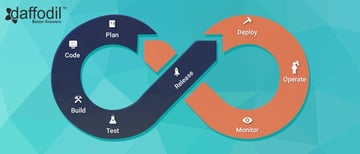
The current smartphone market is dominated by Google’s Android and Apple’s iOS. In the first quarter of 2017, 379.97 million smartphones were shipped worldwide; 327.16 (Android), 51.99 (iOS), 0.82 (others).
With this, mobile apps are and would be the smartphone essential, for sure. Statistics for the year 2017 (Q1) unveil that Google Play Store is home to 2.8 million apps while the iOS Store to 2.2 million apps.
With such great numbers and Android-iOS duopoly, which platform to choose between the two has been a topic of endless debate. However, with a discussion over some major factors, deciding on the app development platform could be easy. Here we are with 5 development aspects that can help you to make an informed decision.
1. Market Share of Android and iOS
In the Q1 of 2017, 86.1 percent smartphones that were sold to the end users were running on Android OS. This includes the Operating System for smartphones, tablets, PDAs, and other mobile devices.
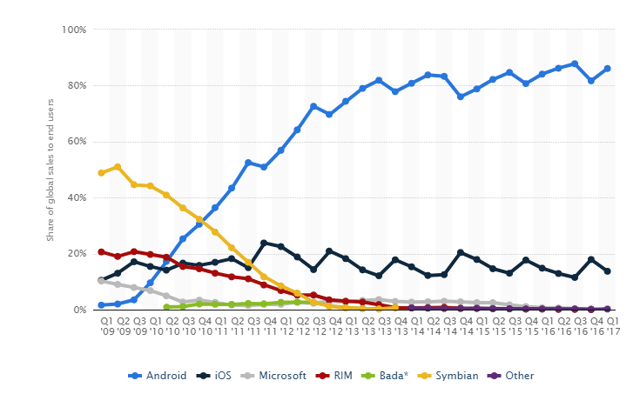
Global Mobile OS Market Share 2017 [Source: Statista]
Reason 1: One of the strongest reasons behind high market share of Android, in comparison to iOS and other mobile OS is the availability of Android to wider range of users. It is believed that there is an Android device for every smartphone user, in terms of budget, features, and usability. Moreover, the list of Android phone manufacturers is staggering. Therefore, mobile apps that are build for Android holds on better chances to reach a lion’s share of targeted users, across the globe.
Reason 2: The average cost per installation (CPI) for Android is just 0.44 USD while it’s 0.86 for the iOS apps (by February 2017). CPI is the amount that users pay for an app installation. Low CPI rate for Android apps estimates that Google Play Store has got more free apps than iOS Store.
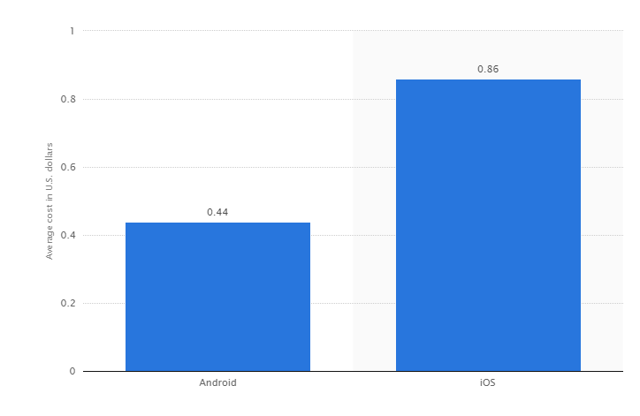 Average CPI for Android and iOS (Globally) [Source: Statista]
Average CPI for Android and iOS (Globally) [Source: Statista]
2. Revenue Generated by Consumer Spend
An app that’s popular and makes profits is like an added feather in the cap. The ideas to monetize a mobile app are quite similar for both Android and iOS apps, but still the revenue generated by app stores vary.
If we talk about the largest single store in context to revenue generation, iOS Store leads the game. However, recent research proves that in the year 2017, Android apps will make more money, which means Google Play Store will continue to dominate the iOS Store (in terms of profit) in the following years. This drastic difference is contributed by third party Android stores that make the consumers to spend more money on the apps.
“By 2021, iOS Store is predicted to have a revenue worth $60 billion through consumer spend, while Google Play Store, along with third party stores will take it to $78 billion.”
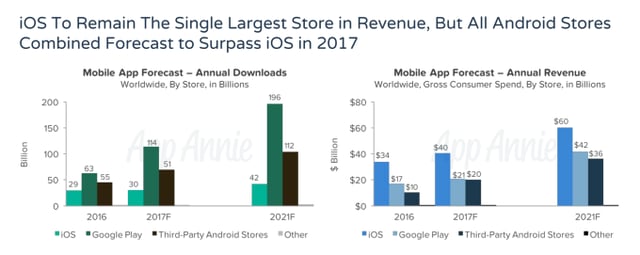
If we go with the stats shared above, app stores for Android and iOS holds equal potential to generate revenue. While the iOS Store is the individual performer , the overall revenue generated by Android apps is supported by third party app stores.
3. Android and iOS Development Ease
Mobile apps have high dependency upon the hardware that they are intended to run on. If we compare the hardware for Android and iOS devices, fragmentation seems to be the biggest concern for Android developers. Simply, if an Android app has to be developed, the developer has to keep countless devices into consideration. This may include different screen sizes, DPIs, aspect ratios, and more. Along with this, there is huge fragmentation in the versions of Operating System.
“By August 2017, Nougat (the latest Android OS edition) runs on 13.5% devices. On the other hand, iOS10 (the latest iOS edition) is running on 87% and iOS9 on 10% devices.”
Also, if we take a look at the market share of Android versions, they are fragmented. This creates a problem for developers as they have to come up with responsive design according to the device (which Xcode supports better than Android Studio). With this, a lot of consideration has to be given when adding a new feature to the app as the difference in versions may prevent a large share of users to access it. In this context, we can conclude that developing an app for iOS platform is a little simpler than for Android.
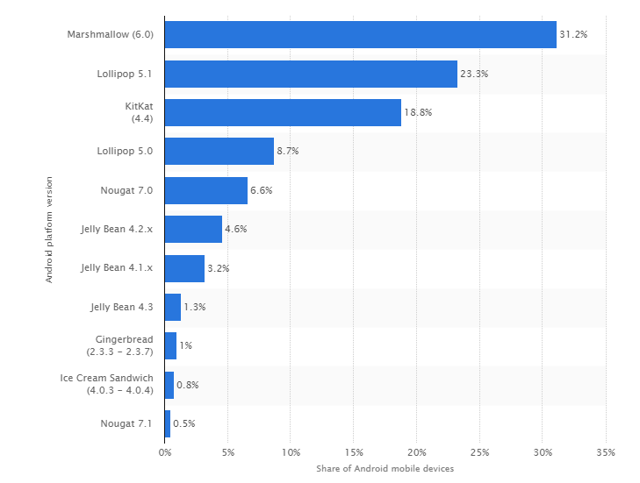
Market share of Android versions 2017 [Source: Statista]
4. App Store Publishing and Restrictions
Android being an open-source offer significant advantages to developers. For beginners, Android gives access to the system’s inner working, which gives developers more space to experiment and give life to their ideas. This can be anything, ranging from app customization to launchers to floating apps (multitasking), and more.
And if we compare the ease of publishing an app on the store, Android comes out to be a sure winner in this case. The matter of fact is, even if iOS does not restrict developers from creating what they want, Apple does. The guidelines to get an app published on iOS store is stringent, as compared to Android.
- For publishing an app on Google Play Store, you need to do one-off payment of 25USD. Once submitted for approval, it takes few hours to get the app reviewed and get the downloads started.
- iOS Store calls for annual, recurring fee of 99 USD for publishing an app. The submission for app needs to be clear and formal, to be understood human testers. Average app store review time is 3 days.
No matter into which industry does your app belong, verifying the guidelines is the most important part of publishing an iOS store. The following example can you an idea about how particular Apple is about when it comes to submitting an app to its iOS store.
“In the year 2009, an eBook app by Ted Lando named ‘Take Control of iPhone OS 3’ was rejected by Apple. The app found its space back in the store when all its references to jailbreaking were removed.”
5. Category Comparison of App Stores
Android and iOS stores have 30+ app categories. To understand which platform works well for your app, you can compare the popular categories of the app. While gaming apps holds the number one position in both the app stores, rest of the 4 categories vary.
In July 2017, business apps were the second popular category, with 9.83% of all active apps on the iOS store being the business app. While in the Google Play, apps within the tools category remain the most downloaded and popular.
Similarly, the third, fourth, and fifth highest app categories vary. In the decision making process of which platform to choose for your app, popularity of the app category can help. If you are developing an app that falls under the business, education, lifestyle, or entertainment category, build it for iOS store first as user base for related apps might be wider here. And you can follow the same platform choosing criteria for Google Play Store apps.
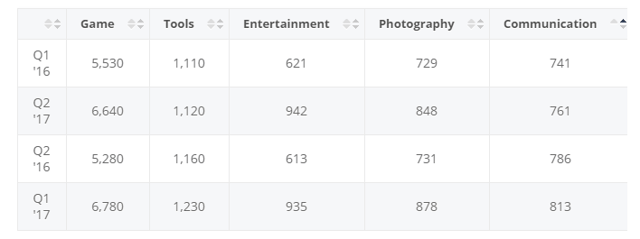 Most popular app categories 2017 (Google Play )
Most popular app categories 2017 (Google Play )
 Most popular app store categories 2017 (Apple)
Most popular app store categories 2017 (Apple)
Conclusion:
Both the app development platforms, Android and iOS have got benefits over one another. While one offers a great market share, another holds the potential to generate amazing revenue, single-handedly.
However, if you find it hard to decide between the two, you can find a way around, and that’s building a hybrid app through cross platform development. It allows developing an app for both the platforms simultaneously, with the amazing ability of code sharing. To know more and get started with your app, you can check out our mobile application development services.



